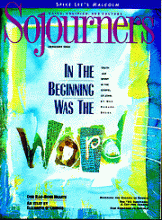CHRISTIAN ACTIVISTS FOR PEACE AND JUSTICE and justice try to join prayer and politics, evangelism and economics, prophesy and peacemaking. Our rootage in scripture, the church's social teachings, and the guidance of Christ and the Spirit give us both perspective on the world's ills and inspiration in our struggle.
As we act in the public arena, however, we inevitably draw upon not only our faith, but also political and economic concepts that help us make sense of our immensely complicated world. Sometimes a particular school of thought seems to have such illuminative power that we adopt large chunks of it to help us understand society, critique inequities, and work for social transformation. This worldview, combined with our faith perspective, gives us a particular political identity.
Leftist ideology is not the only kind of analysis that has influenced Christian peace and justice activists. Clearly, though, it has had a strong impact, including upon readers of this magazine. (Were I writing for another journal, I might be exploring the influence of conservative or rightist ideology on Christian political identity.)
Read the Full Article

